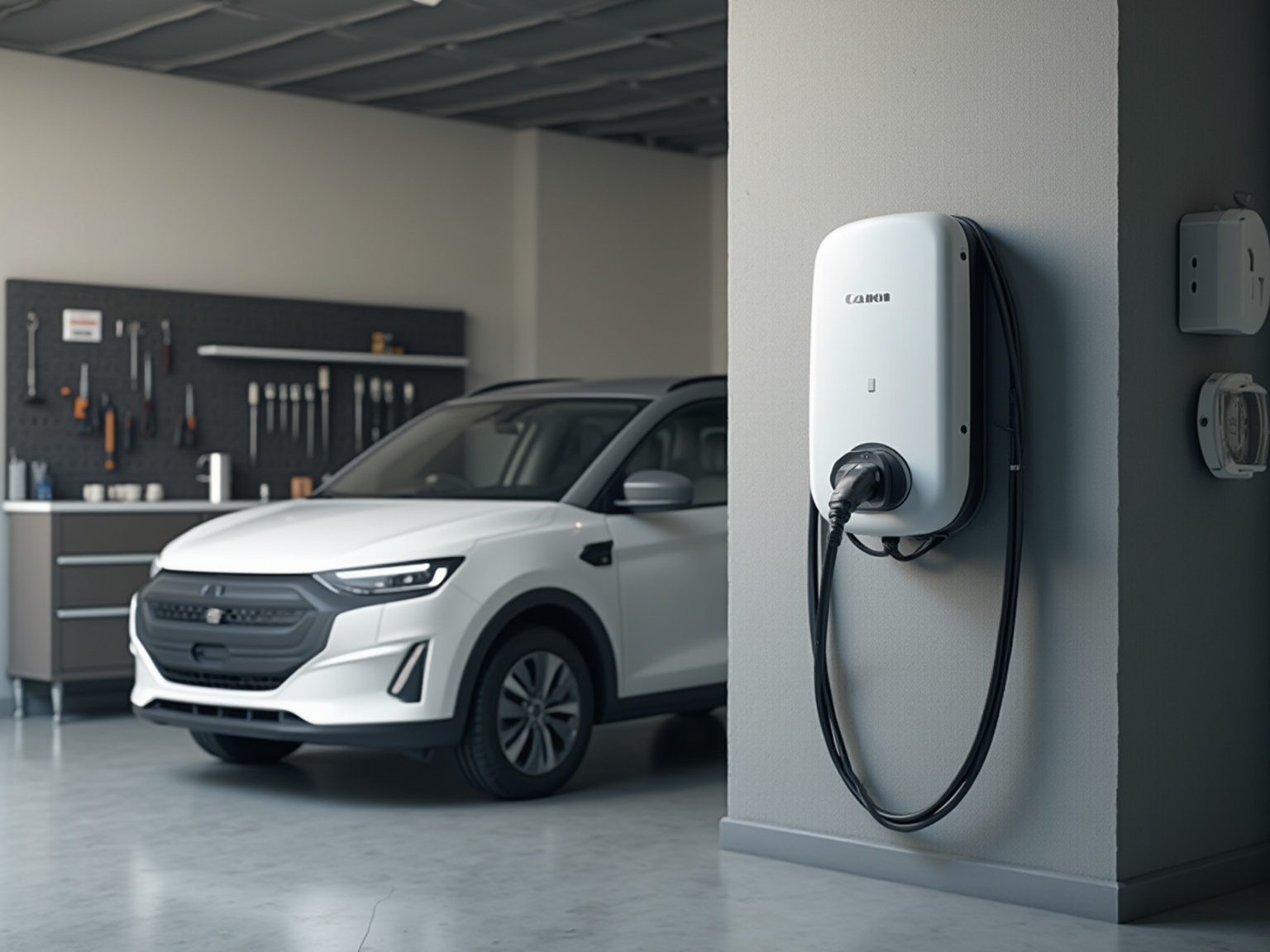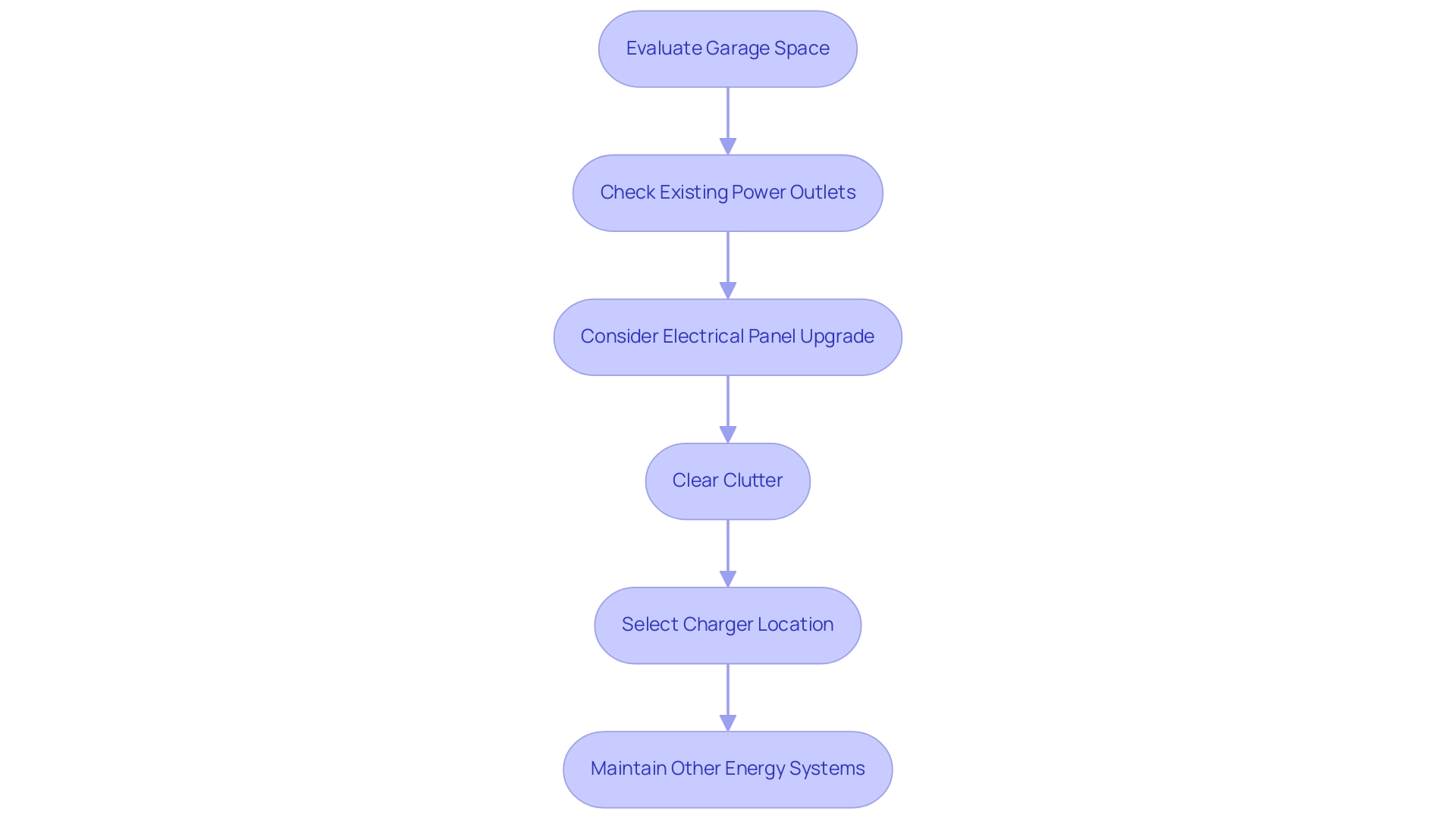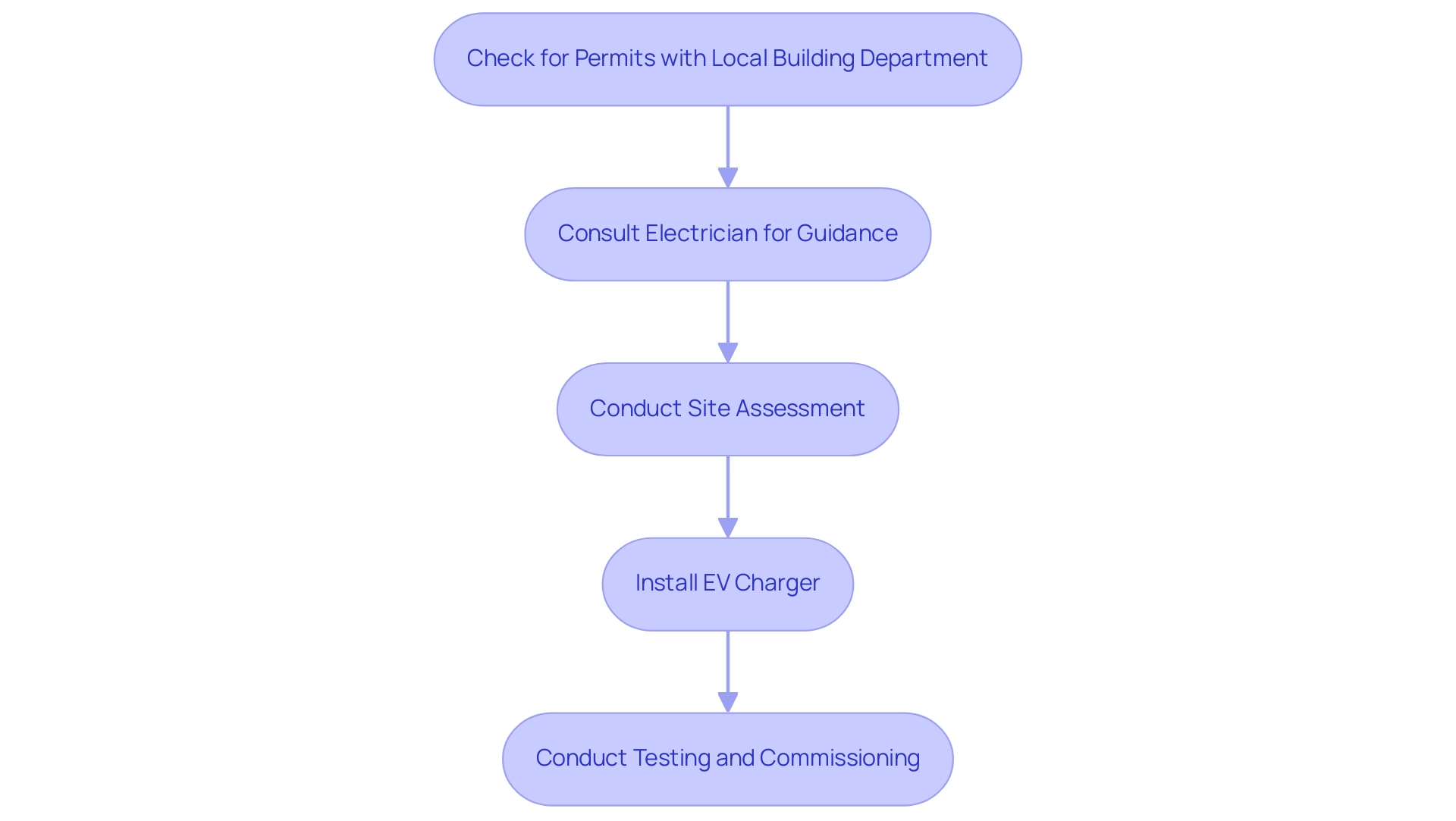Overview
To install a car charger in your garage, it is essential to prepare the space by ensuring adequate clearance, checking electrical capacity, and selecting a suitable charger type, while also considering professional installation for safety and compliance. The article emphasizes that proper preparation and professional installation not only enhance the efficiency of the charging setup but also ensure adherence to safety regulations, ultimately leading to a seamless and eco-friendly home energy solution.
Introduction
As electric vehicles (EVs) become more popular, many homeowners are considering the convenience of installing an EV charger right in their garages. This transition not only supports a sustainable lifestyle but also enhances daily routines by eliminating the need for frequent trips to charging stations.
However, preparing for this installation involves more than just plugging in a charger. From evaluating garage space and ensuring adequate electrical capacity to understanding the different types of chargers available, there are several key factors to consider.
This article will guide homeowners through the essential steps of:
- Preparing for an EV charger installation
- Choosing the right charger
- Navigating permits and regulations
- Understanding the costs involved
— all while emphasizing the importance of professional installation to ensure safety and compliance. Embracing this change can lead to a seamless and enjoyable charging experience, making the shift to electric driving feel effortless.
Preparing Your Garage for EV Charger Installation
Let’s kick things off by taking a good look at your garage space. First and foremost, you’ll want to ensure there’s enough room for your EV charger. Aim for at least 3 feet of clearance around the unit to keep things safe.
While you’re at it, check for any existing power outlets—this will give you a head start in figuring out if your garage’s wiring system is up to the task. If it looks like your garage might be running low on power, you might need to consider upgrading your electrical panel to handle the additional load required to install a car charger in the garage. Don’t forget to clear away any clutter around the installation area! A tidy space creates a safer working environment.
Also, think about the charger’s location in relation to where you usually park your vehicle. Selecting a location that’s easily accessible will enhance your power replenishment experience even more conveniently, which is precisely what we all desire as we shift to electric vehicles.
In Florida, homeowners benefit from advantages such as low energy rates and utility incentives, making at-home power replenishment an appealing choice. As Graham Evans, research and analysis director at S&P Global Mobility, observes, the refueling experience must ‘surprise and delight vehicle owners who will be new to electrification,’ ensuring that it feels seamless and convenient—perhaps even more so than traditional gasoline refueling.
As you prepare your garage for this evolving recharging infrastructure, don’t forget about the importance of maintaining other energy systems in your home, like solar panels. Just as clean solar panels contribute to efficiency and longevity, a properly installed EV station enhances your home’s energy capabilities. At Powercore Electric, we offer a complete setup procedure for your EV power station, which encompasses:
- A detailed site evaluation
- Required electrical enhancements
- Expert setup
- Stringent testing to guarantee everything functions seamlessly
By taking these aspects into account, you can guarantee a seamless and effective setup for your electric vehicle charging station when you install a car charger in the garage, while adopting a more eco-friendly way of living. For expert installation and maintenance services, contact Powercore Electric today and let us help you make the most of your electric vehicle charging experience!
Choosing the Right EV Charger: Types and Requirements
When it comes to powering up your electric vehicle at home, you’ll encounter two main types of EV charging stations: Level 1 and Level 2. Level 1 chargers are the most straightforward, utilizing a standard 120-volt outlet. They’re ideal for overnight power replenishment, allowing you to wake up to a fully energized vehicle.
However, they can be a bit slow, providing about 4-5 miles of range per hour of power-up. On the other hand, Level 2 devices require a 240-volt outlet and significantly accelerate the charging process, offering around 25 miles of range per hour. This makes them ideal for daily use, especially if you have a busy schedule.
Before making a decision, it’s important to consider a few key factors, such as:
- How to install a car charger in the garage
- Compatibility with your vehicle
- How quickly you want to charge
Always check your manufacturer’s specifications to ensure the charger fits your needs. Significantly, a recent report from the Pew Research Center emphasized that EV refueling stations are available in two-thirds of all U.S. counties, which together serve 95% of the population, demonstrating how convenient it is to incorporate EV refueling into your home.
Additionally, 39% of Americans reside within a mile of a public EV power station, further emphasizing the availability of options for potential EV owners. At Powercore Electric Inc., we specialize in services that include installing car chargers in garages, tailored to your needs, alongside our offerings of solar panels and battery backups to enhance your home’s energy efficiency. Our solar panels harness sunlight to generate electricity, reducing your reliance on the grid and lowering your energy bills.
Battery backups ensure that you have power during outages, providing peace of mind and energy security. To illustrate the power delivery landscape, consider the Tesla Supercharger Network, which dominates the U.S. DC fast refueling market, accounting for 58% of the total installed fast chargers. This network, along with others like Electrify America and ChargePoint, showcases the growing infrastructure that supports EV adoption.
Moreover, government programs are available to incentivize the installation of EV fueling stations and solar energy solutions, making it easier for homeowners to transition to sustainable energy. With this knowledge, and with Powercore Electric’s expertise, you can confidently choose the right charging solution for your electric vehicle, paving the way for a more sustainable lifestyle. For more information or to set up a consultation, feel free to contact us at ryan.serrano@powercoreinc.net or call (916) 699-8778.
The Importance of Professional Installation for Safety and Compliance
While tackling DIY projects can be a fulfilling experience, it’s important to recognize that when you install a car charger in the garage, you are working with high-voltage electricity, which carries inherent risks. According to the U.S. Bureau of Labor Statistics, home power fires account for an estimated 51,000 incidents annually, resulting in 500 deaths, 1,400 injuries, and $1.3 billion in property damage. Hiring a certified electrician from Powercore Electric not only guarantees that your setup adheres to the latest safety regulations and local construction codes but also provides reassurance knowing that your electrical system has been appropriately evaluated for compatibility when you install a car charger in the garage.
Our team offers precise estimates and skilled troubleshooting to tackle any potential issues, ensuring a seamless setup process. Additionally, we perform comprehensive home safety assessments to identify any potential hazards that could affect the installation of a car charger in the garage. Furthermore, many manufacturers stipulate that professional installation is necessary to install a car charger in the garage for warranty coverage, making this investment in professional help even more critical.
It’s also worth mentioning that overhead power line contact constitutes 57% of non-electrical occupation fatalities, highlighting the broader dangers linked with this type of work. For example, a buzzing sound from an electrical outlet may indicate a loose connection or faulty outlet, which can lead to serious hazards if not addressed by a professional. Remember, safety first—especially when it comes to electricity!
Trust Powercore Electric to install a car charger in the garage with unparalleled quality craftsmanship and a customer-first approach for all your EV charging needs. Our satisfied customers often share their positive experiences, highlighting our commitment to excellence and reliability in every project.
Understanding the Costs of Installing an EV Charger
When it comes to setting up a Tesla Level 2 EV unit, expenses can differ depending on several key factors such as the kind of device, the complexity of the setup, and local labor rates. Homeowners should typically plan for the following:
- Charging device expenses usually range from $400 to $1,200.
- Setup costs can be between $100 and $800.
- If you’re considering enhancing your home’s electrical system, that could increase your total costs by an additional $650 to $2,000.
- Additionally, permit and inspection fees can range from $50 to $300, depending on your location.
To ease the financial strain, numerous utility firms in Oregon and Washington provide rebates that can lower setup expenses by up to $1,000. To find these incentives, homeowners can check with their local utility providers or visit state energy websites for more information. It’s always a good idea to gather multiple quotes from local electricians to find the best deal tailored to your needs.
Plus, be sure to check for any local incentives or rebates, as these can significantly lower your overall expenses. With the correct information available, you can confidently manage your EV charging setup journey! If you’re interested in additional services like solar panels or battery backups, feel free to reach out to Powercore Electric Inc. at ryan.serrano@powercoreinc.net or call (916) 699-8778 for more information.
Navigating Permits and Regulations for EV Charger Installation
Before proceeding with your EV setup, it’s essential to consult your local building department to verify if you require a permit. Many jurisdictions require permits for wiring work, including setting up your EV charger, which typically involves submitting plans and may include an inspection post-installation. Comprehending these local regulations can facilitate a smoother setup and ensure you meet all safety standards.
Don’t hesitate to lean on your electrician for guidance—they’re well-versed in navigating these requirements and can make the whole process feel effortless. At Powercore Electric, we specialize in services that include how to install a car charger in a garage, beginning with a thorough site assessment to determine the best location and any necessary electrical upgrades. Our setup procedure guarantees your device complies with all safety and regulatory standards.
After installation, we conduct rigorous testing and commissioning to confirm that the charging station functions optimally before it is handed over to you. By choosing to install a car charger in the garage, you’re not just enhancing your home; you’re contributing to a much larger movement! For more information about our services, including solar panels and battery backups, feel free to reach out to us at ryan.serrano@powercoreinc.net or call us at (916) 699-8778.
Conclusion
Embracing the transition to electric vehicles by installing an EV charger at home is a significant step towards a more sustainable lifestyle. As discussed, preparing your garage properly is crucial; ensuring there’s enough space, checking electrical capacity, and choosing an accessible location can greatly enhance your charging experience. Understanding the differences between Level 1 and Level 2 chargers allows for informed decision-making based on your vehicle’s needs and your daily routines.
The importance of professional installation cannot be overstated. Engaging a licensed electrician not only ensures safety and compliance with local regulations but also protects your investment by maintaining warranty coverage. The potential risks associated with DIY installations highlight the value of expert assistance, making it a wise choice for homeowners.
Cost considerations are also a vital aspect of this process. By budgeting appropriately and exploring available rebates, homeowners can navigate the financial landscape of EV charger installation with confidence. Additionally, understanding local permit requirements will streamline the installation process and ensure that everything is up to code.
In conclusion, integrating an EV charger into your home is not just about convenience; it’s an invitation to participate in a greener future. With careful planning, professional support, and a focus on safety and compliance, homeowners can enjoy the benefits of electric driving while contributing to a more sustainable world. Take the first step today and transform your garage into a hub of eco-friendly energy.




